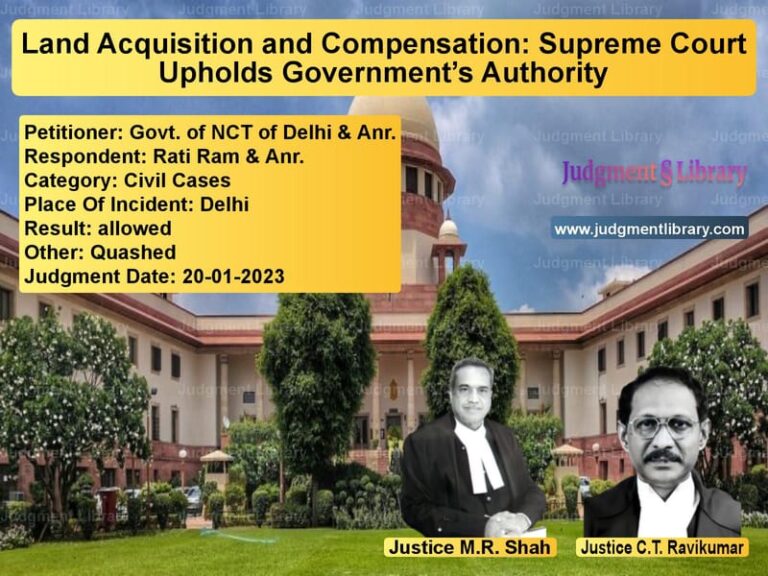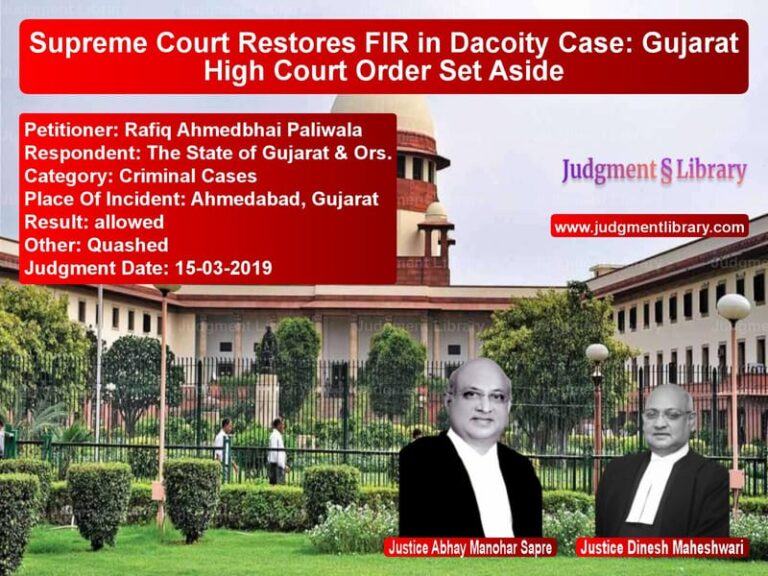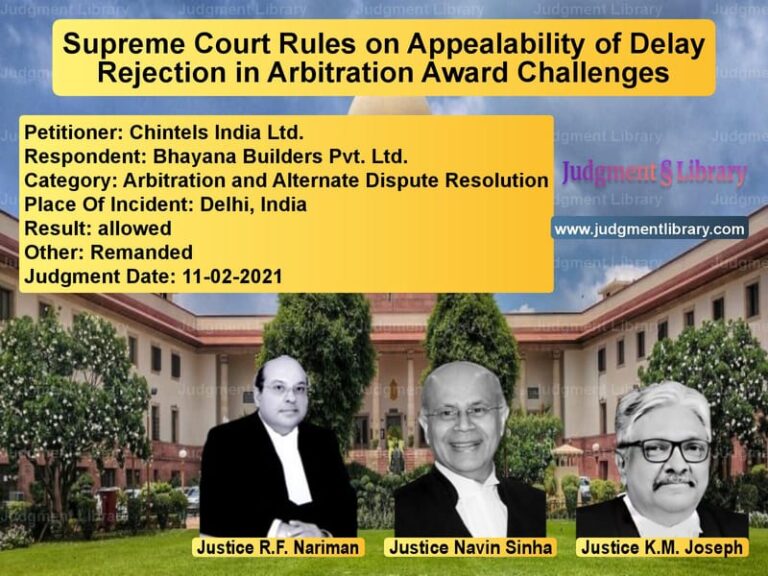Teacher Salary Dispute: Supreme Court Upholds 6th Pay Commission Arrears in Keraleeya Samajam v. Pratibha Dattatray Kulkarni
The Supreme Court of India, in the case of Keraleeya Samajam & Anr. v. Pratibha Dattatray Kulkarni (Dead) through LRs & Ors., upheld the entitlement of teachers and non-teaching staff to receive salary arrears in accordance with the 6th Pay Commission. The Court dismissed the special leave petitions filed by the management of the school and directed them to clear all pending salary dues within eight weeks, failing which an interest of 9% would be applicable.
Background of the Case
The dispute arose when the Keraleeya Samajam, which managed a private unaided school, refused to pay teachers and non-teaching staff salaries as per the revised pay scales mandated by the Maharashtra Employees of Private Schools (Condition of Service) Regulation Rules, 1981. The affected teachers approached the High Court, which ruled in their favor, directing the school management to pay salaries in accordance with the 5th and 6th Pay Commission recommendations.
The management challenged this ruling before the Supreme Court, arguing that the teachers should only receive arrears for the three years preceding the filing of the writ petition. However, the Supreme Court dismissed this argument and upheld the rights of the teachers.
Legal Issues Examined
- Whether teachers and non-teaching staff of the unaided school were entitled to salary arrears under the 6th Pay Commission.
- Whether the management’s plea to restrict arrears to three years preceding the writ petition was valid.
- Whether the management’s failure to pay salaries as per the revised pay scales justified the teachers’ approach to the Deputy Director of Education.
- Whether interest should be imposed on delayed salary payments.
Petitioner’s (Keraleeya Samajam) Arguments
The petitioners, represented by senior counsel, contended:
- That the school was an unaided institution and, therefore, could not afford to pay salaries as per the 6th Pay Commission recommendations.
- That the affected teachers should only be granted arrears for three years preceding the filing of the writ petition.
- That the delay in payment was due to financial constraints and administrative challenges.
- That enforcing the 6th Pay Commission’s recommendations retrospectively would create undue financial hardship.
Respondent’s (Teachers) Arguments
The respondents, represented by their legal counsel, argued:
- That the Maharashtra Employees of Private Schools Regulation Rules made it mandatory for the school to implement the revised pay scales.
- That the teachers had been persistently demanding the rightful payment of their salaries but were forced to approach the High Court due to the management’s inaction.
- That the school was legally bound to pay arrears from the date the 6th Pay Commission became applicable.
- That restricting arrears to three years was unjustified as the management had failed to act despite repeated requests from teachers.
Supreme Court’s Observations
On the Applicability of the 6th Pay Commission
The Supreme Court ruled that the management was obligated to pay the revised salaries and could not escape liability by citing financial constraints:
“As and when the 6th Pay Commission recommendations were made applicable, it was the duty of the petitioner institution to pay the salary/wages to the teaching and non-teaching staff as per the applicable pay scale.”
On the Restriction of Arrears to Three Years
The Court rejected the petitioners’ argument that arrears should be limited to three years preceding the writ petition:
“The respondents were compelled to approach the Deputy Director (Education) only when the petitioners, though required to pay wages as per the applicable rules, failed to make payments. The teachers cannot be penalized for the inaction of the management.”
On the Delay in Salary Payments
The Court held that the management’s failure to pay salaries in accordance with the law was an unjustifiable lapse:
“Every time the teachers were not supposed to approach the appropriate authority for getting the benefit as and when there is a revision of pay.”
On the Payment of Interest
The Court imposed an interest of 9% on the arrears if not cleared within eight weeks:
“The petitioners are directed to clear the arrears within a period of eight weeks from today, failing which it shall carry interest at 9%.”
Final Judgment
The Supreme Court ruled:
- The management must pay salary arrears as per the 6th Pay Commission.
- The plea to limit arrears to three years preceding the writ petition was rejected.
- The management must clear all arrears within eight weeks.
- If payments were delayed beyond eight weeks, an interest of 9% would be applicable.
- The Deputy Director of Education was directed to ensure compliance with the judgment.
Significance of the Judgment
- Ensures Compliance with Pay Commission Recommendations: The ruling reinforces the obligation of schools to pay teachers as per prescribed pay scales.
- Protects Teachers’ Rights: The decision ensures that teachers receive their rightful salaries without undue delay.
- Prevents Exploitation of Employees: The judgment establishes that financial constraints do not exempt employers from paying employees as per the law.
- Establishes Legal Precedent: This case sets an important precedent for other private institutions reluctant to comply with pay commission recommendations.
Conclusion
The Supreme Court’s ruling in Keraleeya Samajam v. Pratibha Dattatray Kulkarni is a landmark judgment in favor of teaching and non-teaching staff. By upholding the 6th Pay Commission recommendations and rejecting the restriction of arrears to three years, the Court has ensured that employees are not denied their rightful wages due to management inaction. This judgment serves as a warning to private educational institutions that failure to comply with legal salary obligations will not be tolerated.
Petitioner Name: Keraleeya Samajam & Anr..Respondent Name: Pratibha Dattatray Kulkarni (Dead) through LRs & Ors..Judgment By: Justice M.R. Shah, Justice A.S. Bopanna.Place Of Incident: Maharashtra.Judgment Date: 01-10-2021.
Don’t miss out on the full details! Download the complete judgment in PDF format below and gain valuable insights instantly!
Download Judgment: keraleeya-samajam-&-vs-pratibha-dattatray-k-supreme-court-of-india-judgment-dated-01-10-2021.pdf
Directly Download Judgment: Directly download this Judgment
See all petitions in Employment Disputes
See all petitions in Public Sector Employees
See all petitions in Pension and Gratuity
See all petitions in Judgment by Mukeshkumar Rasikbhai Shah
See all petitions in Judgment by A. S. Bopanna
See all petitions in dismissed
See all petitions in Declared Infructuous
See all petitions in supreme court of India judgments October 2021
See all petitions in 2021 judgments
See all posts in Service Matters Category
See all allowed petitions in Service Matters Category
See all Dismissed petitions in Service Matters Category
See all partially allowed petitions in Service Matters Category







